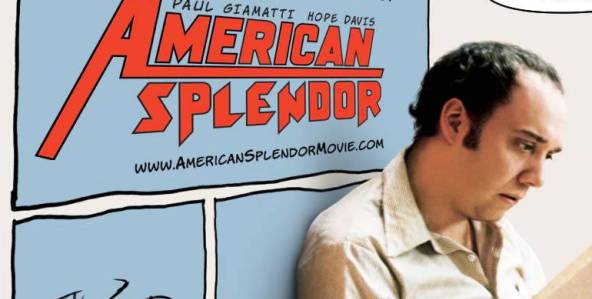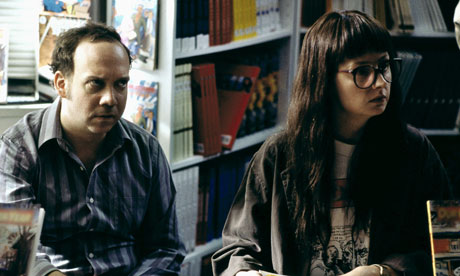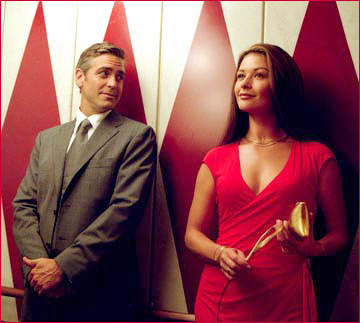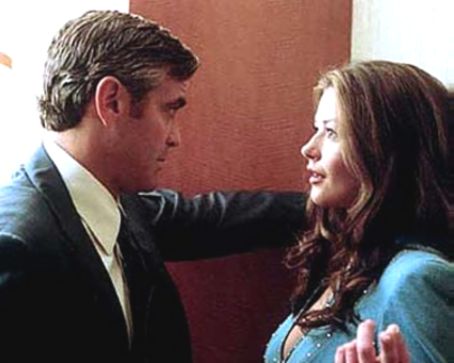On the heels of the Rings trilogy, Isaac Asimov‘s Foundation gets the green light, with Jeff Vintar writing (with I, Robot, this will be his second Asimov project) and Shekhar Kapur (Elizabeth) directing. I’m down, although I’d think much of the first book will be particularly hard to translate into cinema.
Category: Cinema
Tricksy! False!
Alas, I completely missed out on Tolkien Trilogy Tuesday tickets this past Thursday – The NYC show was sold out before they ever made it online, and I couldn’t make it down to line up due to sections. Hope some of y’all out there had better luck.
Itinerant Jedi.
In the trailer bin today, Ewan MacGregor channels Albert Finney instead of Alec Guinness in Tim Burton’s Big Fish, while Hayden Christiansen proves Anakin’s Episode II whininess might not be acting in the trailer for Shattered Glass.
The End is Near.

A Danish film site releases 16 quality stills from the RotK trailer, including better looks at Oliphaunts, the Pelennor Fields, and Shelob. (And, yes, contrary to initial impressions, Baby’s definitely got back.)
Confessions of two Dangerous Minds.
Spike Jonze and Charlie Kaufman, the team behind Being John Malkovich and Adaptation, prepare to make a horror film. I’ll go see it.
Deconstructing Harvey.

After a few weeks of circling around it, I finally caught American Splendor Thursday night and…I’m finding it a hard movie to write about. On one hand, the film works as a great introduction and overview to the weird world of cartoonist, file clerk, and now weblogger extraordinaire Harvey Pekar. (Indeed, as David Edelstein notes, with its litany of daily mundanities endured and overcome, Pekar’s comic seems an early ancestor of the blog.) The film does a great job of appropriating comic book syntax to tell its story (and in so doing makes Ang Lee’s recent flop look even worse.) And the performances are all quite good, particularly Hope Davis as Pekar’s third wife Joyce Brabner.
All that being said, I admired the film as an intellectual exercise, but never really connected to it emotionally. With a nod to Annie Hall (and of course, the original American Splendor comic), the movie breaks the fourth wall early and often and continually makes a point of its own artifice. But, as a result (and I know this was the point, made explicit with the Donal Logue/Molly Shannon sequence), much of the film came off as artificial and thus not very interesting – I found myself waiting patiently through the Giamatti-Davis scenes just to get another glimpse of the real Pekar, whose impish energy was much more engaging than anything else in the film. (Along the same lines, I thought Splendor also suffered in light of the brilliant and disturbing Crumb – James Urbaniak does a really great Robert Crumb impression, but the memory of that hard-to-forget documentary made him seem all the more like an actor doing an impression.) Moreover, once the story enters the “Our Cancer Year” period, which is obviously a crucial and necessary element of Pekar’s life trajectory, the film takes on the additional thematic weight of encroaching mortality and disease overcome, which is a far cry from the daily dilemmas and annoyances that animate the Splendor comic. As a result, the film seems to devolve in the final third into a conventional biopic. In the end, I enjoyed the movie, and particularly the first half, which feels more like Pekar’s work. But I ultimately found myself thinking that my time with Pekar might have been better spent if I had just unearthed the old issues of American Splendor and started reading. (Pekar blog link via Lake Effect.)

Bring your towel.
After years in development Hell, complicated by the death of Douglas Adams, the film version of Hitchhiker’s Guide to the Galaxy finally gets a thumbs up. Let’s hope they do it right.
Hello, Cruel World.
 So some friends of mine managed to secure early passes to Intolerable Cruelty, and I’m pleased to report that the Coens’ first foray into full-fledged romantic comedy (although one could argue for The Hudsucker Proxy) is an out-and-out winner. I’d heard earlier that the Coens had diluted their trademark zaniness for the sake of a mainstream audience this time around, but I found the reverse to be true — the brothers have instead juiced up what could have been a tired genre exercise (Imagine this film with Matthew McConaughey, Hugh Grant, Kate Hudson, or Sandra Bullock) with their unique flair and managed to create one of the best, funniest romantic comedies I’ve seen in some time. George Clooney – whom I generally like – is better here as the smooth, almost-imperturbable dental-obsessive Miles Massey than he ever was in O Brother (where he was also good but ever so slightly miscast), and Catherine Zeta-Jones makes for a stunning and worthy adversary as Marilyn Rexroth, eater of men. As for the rest of the cast, they — except for perhaps Geoffrey Rush, who is a little too manic — revel in the type of quality and/or hilarious supporting parts that the Coens continually provide (along with the big names, keep an eye out for Newhart‘s Julia Duffy and, ever so briefly, Bruce Campbell.)
So some friends of mine managed to secure early passes to Intolerable Cruelty, and I’m pleased to report that the Coens’ first foray into full-fledged romantic comedy (although one could argue for The Hudsucker Proxy) is an out-and-out winner. I’d heard earlier that the Coens had diluted their trademark zaniness for the sake of a mainstream audience this time around, but I found the reverse to be true — the brothers have instead juiced up what could have been a tired genre exercise (Imagine this film with Matthew McConaughey, Hugh Grant, Kate Hudson, or Sandra Bullock) with their unique flair and managed to create one of the best, funniest romantic comedies I’ve seen in some time. George Clooney – whom I generally like – is better here as the smooth, almost-imperturbable dental-obsessive Miles Massey than he ever was in O Brother (where he was also good but ever so slightly miscast), and Catherine Zeta-Jones makes for a stunning and worthy adversary as Marilyn Rexroth, eater of men. As for the rest of the cast, they — except for perhaps Geoffrey Rush, who is a little too manic — revel in the type of quality and/or hilarious supporting parts that the Coens continually provide (along with the big names, keep an eye out for Newhart‘s Julia Duffy and, ever so briefly, Bruce Campbell.)
 I suppose faults could be found with the predictableness of it all – the movie does follow the traditional romantic comedy story arc the way through. But, the Coens still manage to squeeze in a few clever twists along the way. I dunno…it just worked for me. On one hand, there are goofy, slapstick moments in Intolerable Cruelty (one involving spray mace, for example) that you can see a mile off and normally would have fallen flat, but are redeemed by Clooney and the Coens, who all appear to be working effortlessly. On the other, there are plenty of clever quips and sight gags (the waiting room magazine, or Clooney’s assistant’s T-shirt in the tennis scene) that prove how funny the creators of The Big Lebowski and Raising Arizona can be when they’re in a groove. Cruelty isn’t as funny as either of those two films, nor as memorable as Fargo or Miller’s Crossing, but it is an excellent entry in the romantic comedy genre, with just enough Coen to keep you laughing. Take it as such, and you should have a grand ole time.
I suppose faults could be found with the predictableness of it all – the movie does follow the traditional romantic comedy story arc the way through. But, the Coens still manage to squeeze in a few clever twists along the way. I dunno…it just worked for me. On one hand, there are goofy, slapstick moments in Intolerable Cruelty (one involving spray mace, for example) that you can see a mile off and normally would have fallen flat, but are redeemed by Clooney and the Coens, who all appear to be working effortlessly. On the other, there are plenty of clever quips and sight gags (the waiting room magazine, or Clooney’s assistant’s T-shirt in the tennis scene) that prove how funny the creators of The Big Lebowski and Raising Arizona can be when they’re in a groove. Cruelty isn’t as funny as either of those two films, nor as memorable as Fargo or Miller’s Crossing, but it is an excellent entry in the romantic comedy genre, with just enough Coen to keep you laughing. Take it as such, and you should have a grand ole time.
San Quentin.
In a cover story, the Village Voice checks in with QT on the eve of Kill Bill Vol. One. My feeling right now is that it’ll either be really good or really terrible.
Autumn of the Soul.
Woe are the writers of Salon, who’ve soured on both sex and the cinema of the 00‘s. C’mon, y’all, the New Millennium ain’t all that bad.
